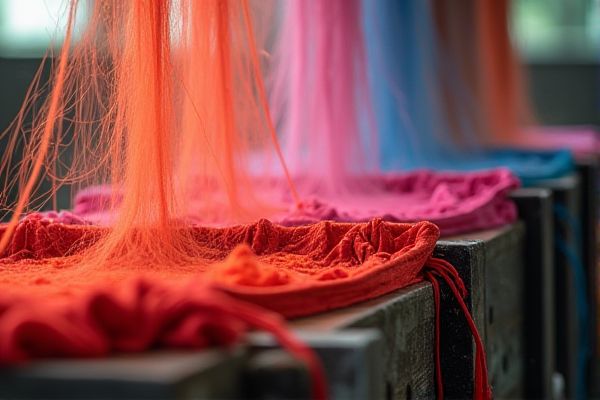
The dyeing industry in Bangladesh presents significant job opportunities, driven by the country's robust textile and garment manufacturing sectors. Skilled workers are in demand for various roles, including dyeing technicians, color specialists, and machine operators, providing a chance for individuals to specialize in textile chemistry and color technology. Many companies also offer training programs, fostering career growth and enhancing skills in sustainable dyeing practices. With the global push for eco-friendly textiles, roles that focus on innovative and environmentally responsible dyeing methods are increasingly sought after.
Job Description
Dyeing jobs in Bangladesh involve the application of color to textiles through various techniques, ensuring vibrant and consistent results. Workers typically operate dyeing machines, monitor color concentrations, and adhere to strict quality control measures. Knowledge of different dye types, such as fiber-reactive and acid dyes, is crucial for achieving the desired outcomes. Opportunities in this sector are abundant due to the country's extensive textile industry, making it ideal for individuals pursuing a career in dyeing and finishing operations.
Requirement
Dyeing jobs in Bangladesh typically require candidates to have a background in textile engineering or garment manufacturing. Familiarity with various dyeing techniques and color matching is essential, as this knowledge directly influences the quality of the final product. Experience with dyeing machinery and an understanding of chemical safety protocols are also highly valued by employers in the industry. Strong attention to detail and the ability to work as part of a team are crucial for success in these roles, ensuring that the production process runs smoothly and efficiently.
Salary and Perks Expected
Dyeing jobs in Bangladesh typically offer competitive salaries that range significantly based on experience and skill level, often starting from BDT 15,000 to BDT 25,000 per month. Many companies in the textile sector provide additional perks, such as health insurance, transportation allowances, and overtime pay. Opportunities for career advancement exist, especially for those who acquire specialized skills in dyeing techniques or quality control processes. With Bangladesh being a leading player in the global textile industry, your prospects for growth in this field are promising, especially as demand for skilled labor continues to rise.
Similar Job Names
- Dyeing Supervisor
- Dyeing Technician
- Dye House Manager
- Color Matching Specialist
- Textile Dyeing Operator
- Quality Control Inspector
- Fabric Dyeing Machine Operator
- Dyeing Process Engineer
- Production Planner
- Chemical Analyst
- Lab Technician
- Colorist
- Dyeing Production Manager
- Sample Dyeing Technician
- Environmental Compliance Officer
Job Expectation Concept
In Bangladesh, the dyeing job sector plays a crucial role in the textile industry, which significantly contributes to the nation's economy. This sector often expects workers to demonstrate a mix of technical skills, such as knowledge of various dyeing techniques and color matching, alongside a strong commitment to quality control and safety practices. Opportunities for career advancement can arise through gaining experience and expertise in modern dyeing technologies, which are increasingly popular among local manufacturers. Emphasizing efficiency and sustainability can further enhance your prospects in this competitive job market, making you a valuable asset to any organization.
Career Advantage and Weakness
Dyeing jobs in Bangladesh offer a significant career advantage due to the country's booming textile industry, which is one of the largest in the world. This sector provides numerous employment opportunities, fostering skill development and contributing to economic growth. However, the industry also faces challenges, including concerns over environmental practices and worker safety, which can impact job satisfaction and conditions. As you consider a career in dyeing, weighing these factors is essential for making informed decisions about your future in this vibrant sector.
Important Thing Must Know
Dyeing jobs in Bangladesh play a crucial role in the textile industry, which accounts for a significant portion of the country's exports. Skilled labor is essential in this field, as the dyeing process requires expertise in color matching and chemical handling. Workers often operate large machinery and maintain strict quality control to ensure that fabrics meet international standards. Training programs are available to enhance your skills and make you more competitive in this thriving job market. Understanding the environmental regulations and sustainability practices in dyeing operations is increasingly important for both employers and employees in Bangladesh.
Alternative Career Options
In Bangladesh, the textile and dyeing industry offers various alternative career options beyond traditional dyeing jobs. You can explore opportunities in textile design, quality control, and fabric technology, all of which are essential for ensuring high standards in production. Roles in supply chain management and sustainability consulting are also gaining popularity as the industry shifts towards eco-friendly practices. Engaging in these fields can provide you with diverse career paths while contributing to the growth of the Bangladeshi textile sector.
Companies List
- Ananta Group
- Beximco Textiles
- DBL Group
- KDS Group
- Ha-Meem Group
- Knitwear Group
- Tita, Ltd.
- Bashundhara Group
- Ahsan Group
- Sinha Group
List of Ideal City
Bangladesh has several cities that are ideal for dyeing jobs, providing ample opportunities for skilled workers in the textile sector. Dhaka, the capital, is a major hub, with numerous garment factories specializing in dyeing processes. Chittagong, known for its port, also supports a thriving textile industry that requires expertise in dyeing techniques. Narayanganj, often referred to as the "Dyeing Capital," is another key location, with a concentration of dye houses and processing facilities catering to both local and international markets.
 jobs-bangladesh.com
jobs-bangladesh.com